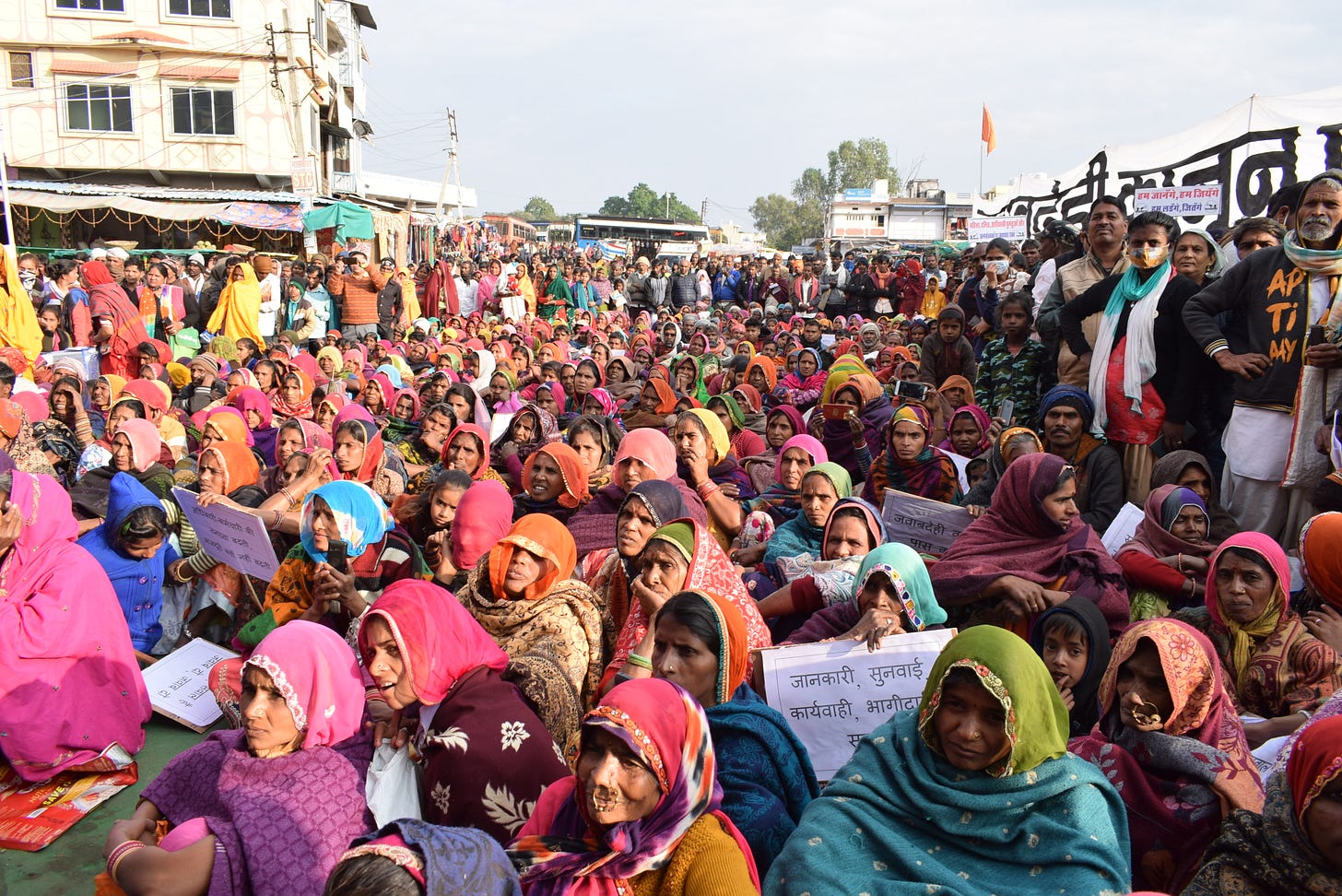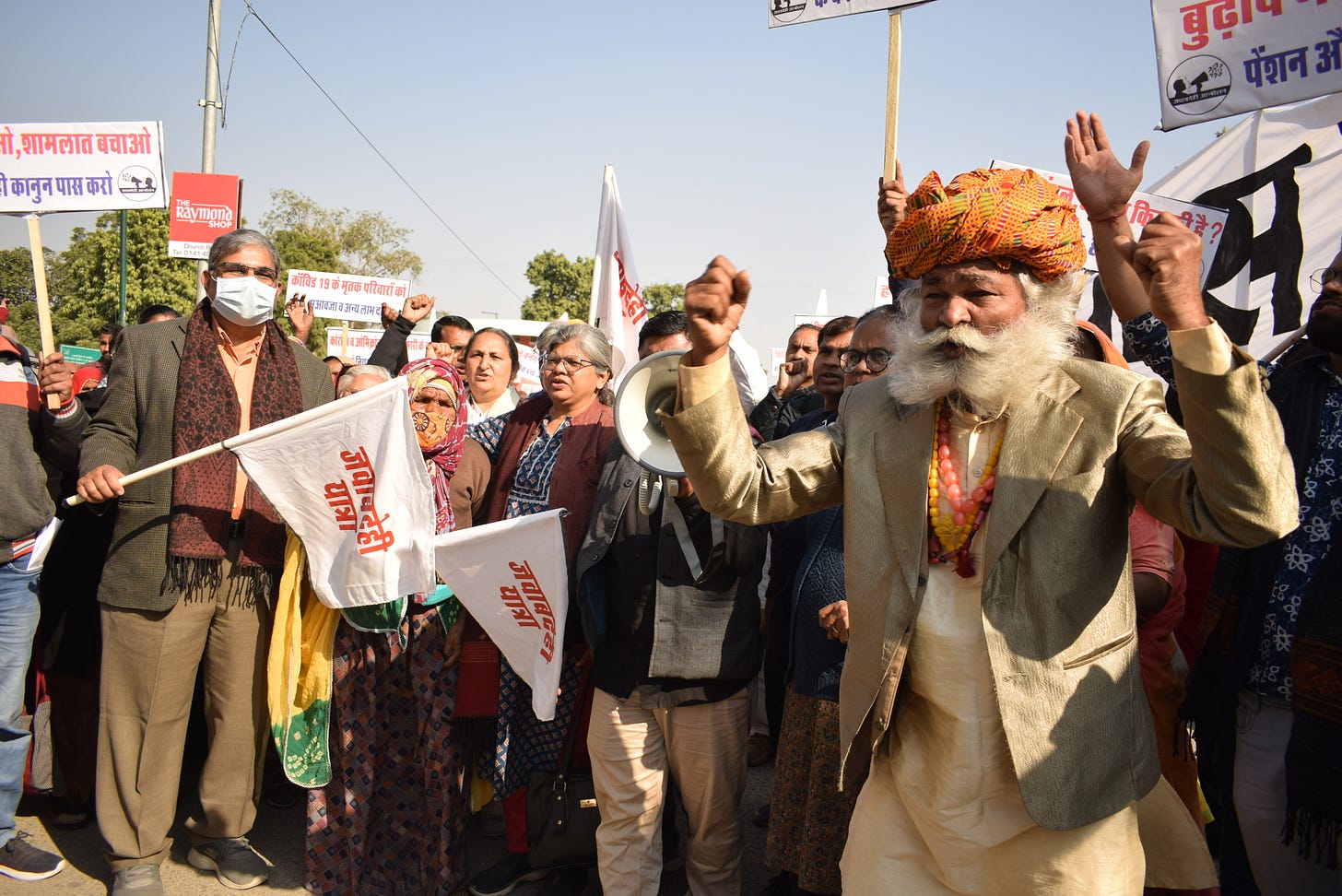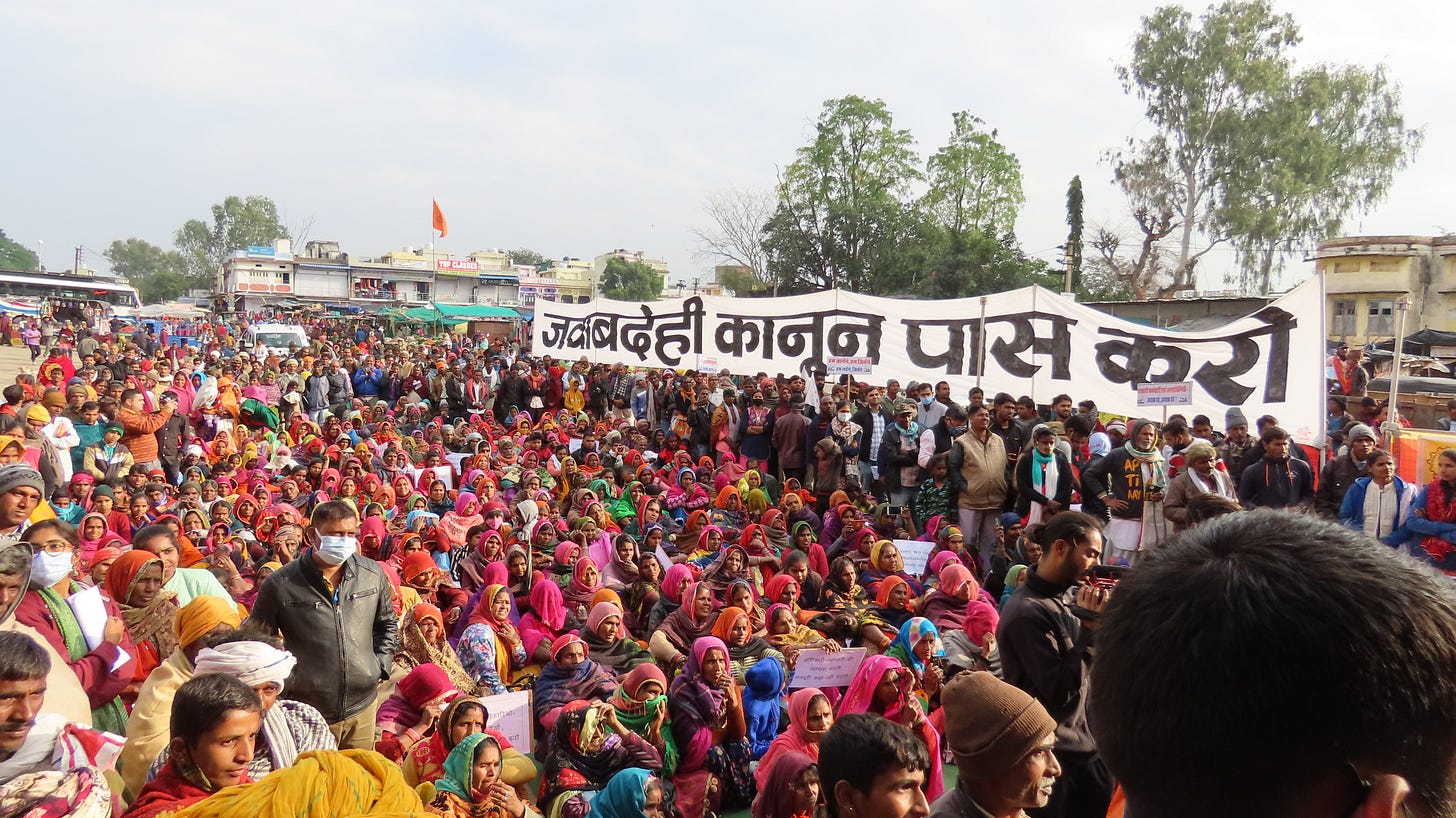In Spotlight: Jawabdehi Andolan
A movement pioneering a framework and process for state accountability

In December 2021, over a hundred people drawn from different social movements in Rajasthan set off on a statewide journey, the jawabdehi yatra. They aimed to reach out to a multiplying crowd of people and communities struggling to realise their basic entitlements, farmers, daily-wage labourers, widows, and pensioners - in all thirty-three state districts. They sought allies and support for a social accountability law that the state government had promised.
Five years ago, in 2015-16, they launched a similar yatra that travelled through the state for a hundred days and gathered ten thousand grievances from the people. The yatra ended in a twenty-two-day dharna where, amongst many other demands, they raised a specific demand for digitised information on twelve and a half lakhs stopped pensions and related grievances. Through their protest and advocacy, they discovered that two and a half lakhs of these pensioners were classified as dead. In reality, over eighty per cent (in one block, for example) were alive. And a few of those that were indeed dead, had died after the government wrote them off as dead.
Some questions began to gnaw at the leaders of these protesting crowds: why did the people of India not even know what was happening to prevent them from realising their basic rights? Why did they have to protest and navigate extreme hurdles to enforce their rights repeatedly? Why is the liability of securing rights, at an individual and collective level, on citizens; with no accountability of those who are paid to enforce those rights and deliver basic services?
Jawabdehi Andolan stepped in and began asking: why isn’t the onus on the government to do their job? Why is there no process to enforce accountability of the state and its functionaries? And how do we now get them to carry out their mandate - do their job? Jawabdehi. Accountability. Andolan. Movement.
The movement’s song asks for jawab (accountability)
The Six Principles of Accountability to the People
Naturally, the framework for government accountability to the people came from the people - a group of young people of a sister-movement fighting Dalit atrocities, the Dalit Andolan in Bhilwara. Sharing the learnings from their lived experiences of enforcing their rights, along with the Mazdoor Kisan Shakti Sangathan (MKSS) with whom they were allied, they laid down a six-principle path to accountability.
Jankari (Access to Relevant Information): “Pehle humein jankari chahiye, sirf suchna nahin - woh propaganda hai. First, we want information relevant to us, not advertisements of schemes - that is propaganda.”
Sunvahi (Right to be Heard): “Doosri baat, jankaari bhi mil jaaye, toh iss desh mein sunvahi nahi milti. Secondly, even if we get access to some information, this country doesn’t let us establish a line of communication where we can speak in our voice.” They weren’t satisfied with letters or emails getting lost in the governments’ flooding post boxes and inboxes. They needed dated and timed proof that their grievance had indeed been heard and registered.
Karwahi (Right to Time-Bound Grievance Redressal): “Teesri, sunvahi hai, to karwahi ki koi guarantee nahin. Third, if we manage to get our voices heard, there is no guarantee that we will get an answer in a fixed time frame. Are we going to get redressal? If yes, in what time frame? If not, why not?”
Bhaagidari (Right to Democratic Participation): “Ab karwahi bhi ho jaaye, toh yeh afsar log apas me baith ke keh dete hai, tumhari shikayat me koi dum nahi hai. So, bhagidari chahiye. Now let’s assume that happens too. Next, we will hear bureaucrats deciding amongst themselves that our grievances are baseless. So we need to be able to inform them as they work to address our grievances. All sides need to be present in this process.”
Suraksha (Right to Protection): “Iss desh me sabse pehle pitne wale toh shikayat-karta hi hai, toh humein suraksha chahiye. The first reaction of the power structure to a complaint is to suppress and even physically attack the complainant. The people who face the greatest lack of security in this country are rightful complainants. So, give us security.”
Janta ka Manch (People’s Platform): In addition to these five principles, MKSS added the need for a collective public platform for representatives of the state and citizens to dialogue for accountability. They argued that the people can only decide what’s essential to the people. In enforcing their right to participate in shaping solutions and policies concerning them, they were reclaiming power as democratic citizens.

Actioning the Principles
Historical Firsts
As the first step, the leaders decided they didn’t want to apply through physical forms for information when the government had it in digitised form. They wanted this information to be readily available and consumable to all.
The resulting solution after three years of intense advocacy for open access to digitised information, hidden for the most part behind ‘admin logins’, was the ‘Jansoochna portal’. A Rajasthan government-owned-and-operated digital platform where information regarding all public-related departments is accessible and consumable on a single platform.
But this portal is unlike every other government portal out there. What goes on, when, and how isn’t decided by the government alone. The doorway stands on top of a ‘Janta ka Manch’. Every month, in a transparent and collaborative dialogue, civil society members, bureaucrat departments, and the IT department come together to discuss what information needs to go onto the portal and how it can best be laid out for citizens to consume.
On the portal, while accessing 115 departments, 326 schemes, and 686 information on schemes, you read that this portal exists to aid the implementation and execution of Section 4 of the RTI Act. Its direct impact is reflected in over ten crore visits and eleven crore information downloads in just under two years.
Now, they’re moving towards actioning the other principles by proposing a law for accountability. Jawabdehi Kanoon.
In the ‘Social Audit Standards’ published by the Comptroller and Auditor General of India (CAG), these six principles (now called the Bhilwara Principles of Social Accountability) have been mentioned and adhered to. The two official drafts of the accountability law in Rajasthan have also adopted these principles.
The advocacy of Jawabdehi Andolan has resulted in a commitment from the Government of Rajasthan and the Chief Minister of Rajasthan to pass an accountability law. In October 2022, the government put out a draft law in the public domain asking for comments. The movement has started reaching out to citizens to submit informed responses to pass and implement a strong and effective accountability law. The movement intends to press for it not only till it is passed but also to work towards ensuring effective implementation.

Movements that Sustain
The Leaders of Jawabdehi Andolan are social movement individuals and organisations, networks, and communities across several sectors with varying interests and formations who have come together as the Soochna Evam Rozgaar Adhikar Abhiyan (SR Abhiyan) in the state of Rajasthan.
They all believe that a movement’s energy comes from its individuals and the collectives who have the most at stake. They insist that social change has to come from messy alliances and slow, painstaking dialogue and co-creating - the real essence of democracy.
Now prominent in Rajasthan and spreading in different ways in many states, Jawabdehi Andolan’s theory of change is disarmingly simple, bring people together for democratic and constitutional rights, and let the magic unfold.
Note:
*The Jawadehi Andolan team singing the ‘Jawabdehi’ song at the Agami Summit 2022.
Edited by Keerthana Medarametla and Supriya Sankaran.





